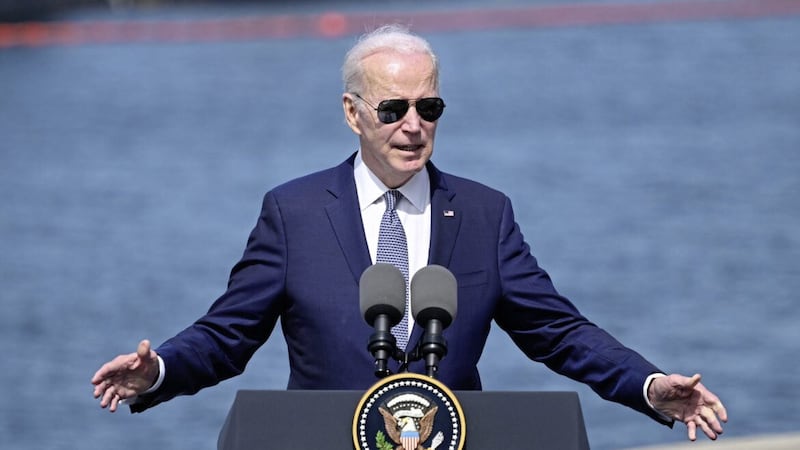A visit by US president Joe Biden has been confirmed for the Good Friday Agreement anniversary. Stormont will not be restored for the occasion, judging by remarks from Sir Jeffrey Donaldson. Speaking in Washington, the DUP leader said: “I want to get this right. However long that takes is how long it will take.” He added a critique of the Windsor Framework that suggests several more months of stalling lie ahead.
The original plan for Biden’s visit would have seen him address the assembly, heaping praise on our politicians in front of the world. Instead, Stormont will be shut and the president may be unable to resist one of his trademark quips about recalcitrant Orangemen.
Donaldson is now stating fairly unambiguously the DUP will hold out for one last round of protocol negotiations, extracting a few final concessions, or at least the appearance of concessions.
Everyone else, including prime minister Rishi Sunak, is insisting no further negotiation is possible but as Donaldson points out, unionism has heard this before.
***
A LucidTalk poll for the Belfast Telegraph has shown 54 per cent of DUP voters oppose restoring Stormont over the protocol, down from 66 per cent six weeks previously.
This has led to much reading of the unionist runes over when it might be safe for Sir Jeffrey Donaldson to restore devolution. Although LucidTalk has a strong track record predicting elections, analysing sub-sets of surveys is a practice it cautions against itself.
With only 297 DUP voters in the weighted sample, the margin of error is 6 per cent even if the weighting process is flawless.
In reality, any party depending on survey changes on this scale for a major decision is not leading their supporters – and may not even be following them in the right direction.
***
Friends of Sinn Féin, the party’s US fundraising arm, has marked St Patrick’s week by placed ads in American newspapers demanding a border poll. The ads have become an annual tradition and lavish spending on them this year was doubly guaranteed - Sinn Féin’s finances are under increasing scrutiny in the Republic, where parties cannot spend money raised abroad.
Taoiseach Leo Varadkar said the ads were “unhelpful” and Sir Jeffrey Donaldson called them “divisive” but of course Sinn Féin is fully entitled to campaign for a united Ireland.
The real problem with the ads is they imply the UK government is refusing to hold a border poll in breach of the Good Friday Agreement. This is incorrect and Sinn Fén clearly knows it – the ads stop just short of making the accusation directly, although that will have passed over the heads of most American readers.
***
The detection of vehicles travelling at over 160mph near Saintfield is emblematic of increasing anarchy on our roads. PSNI enforcement is suffering from budget constraints, as the chief constable has admitted and errant drivers have realised. The task is outdated anyway: modern traffic volumes and technology mean speed detection is an absurd use of scarce police resources.
Other countries have addressed this with degrees of privatisation. Ireland privatised its speed cameras in 2007; France its speed patrols in 2018. In both cases, government continues collecting the fines and operators are paid by contract, addressing any concerns about targeting motorists to make a profit or to raise revenue.
***
Northern Ireland’s energy companies have been criticised by the utility regulator for unacceptable call centre performance.
The regulator, Kevin Shiels, linked this to calls from consumers due to the energy crisis and government support payments. However, he did not refer to the financial incentive to keep switchboards understaffed.
Because the crisis has not been as bad as predicted many customer accounts are in substantial credit. Companies benefit from holding all that cash and they cannot be asked for it back if they never answer the phone.
***
Hapless UK plans for an electronic visa waiver appear to have finally tipped the Committee for the Administration of Justice over the edge. The well-known south Belfast campaign group has warned the scheme could lead to third country nationals living in the Republic being stopped at the border, transferred to indefinite detention in Britain, then deported to Rwanda. It adds this could also happen to American tourists on day trips from Dublin to the Giant’s Causeway.
In reality, the UK recently exempted third country residents of the Republic from the waiver and it has always said there will be no checks on the border for anyone. The scheme remains a fiasco for tourism but deportation to Rwanda is obviously never going to happen – the Home Office can barely deport people when it wants to.
***
The Ulster Folk Museum is to receive a £50 million investment. Hopefully, a few pennies can be found for the Ulster Transport Museum across the road. Its cafe was recently shut and replaced with vending machines, which looks like a desperate economy. It also has nowhere to lock up a bicycle, as my eldest son and I were amazed to discover last month. We had no grounds to complain as staff helped us find a secure spot in their own car park. But a transport museum without a bike rack feels like something that could only happen here.









